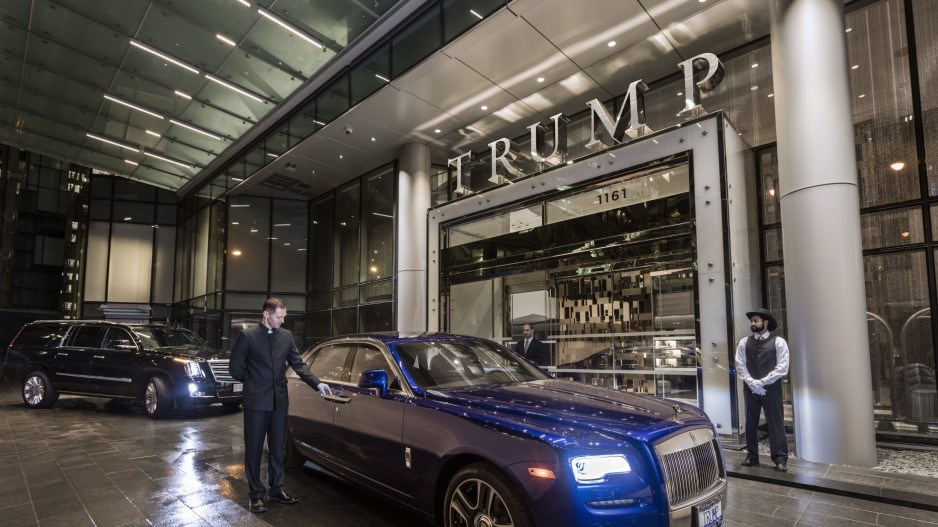The Canadian government continues to widen the net cast over Vancouver’s real estate market to catch possible tax cheats, now ensnaring the developers behind Vancouver’s Trump Tower, the sprawling Wall Centre Central Park project near the Vancouver-Burnaby border and Amacon’s Tempo project in Richmond.
The Minister of National Revenue has gone to the Federal Court of Canada again to glean information from developers about pre-sale condo buyers who assigned their contracts prior to construction completion. On July 19, the government filed three more applications in Vancouver for information on pre-sale flippers.
One application names West Georgia Development LP, West Georgia GP Ltd. and West Georgia Holdings Inc., and seeks to verify income tax and excise tax compliance of flippers who bought into the “Residences at Trump International Hotel & Tower.”
Another names Wall Centre Central Park Condominiums LP, WCCP Developments (GP) Ltd. and BJW Holdings Ltd. as respondents, and the minister is seeking information on pre-sale buyers from its multi-tower Central Park development, including the towers at 5515 and 5665 Boundary Road, the Orimdale Tower at 5598 Ormidale Street, and the “Wall Centre Central Park - Phase 2,” at 5470 Ormidale Street in Vancouver.
The third names Amacon Alderbridge Development Partnership, Amacon Alderbridge Development LP, Amacon Development (Alderbridge) Corp., Luci Marketing Ltd., and Amacon Project Management Services Corp. as respondents. In a boiler-plate application like the others, the Minister of National Revenue seeks information about pre-sale flippers at the companies’ Tempo condominium project in Richmond on Alderbridge Way.
None of the companies responded to Business in Vancouver’s requests for comment. Lise Walsh, a tax lawyer with the Department of Justice, did not respond to BIV’s request for comment.
The CRA’s forays into Federal Court are not limited to probing developers, however, as the government is set for a showdown in October with a group of taxpayers who claim their Constitutional rights have been trampled upon by the CRA’s efforts to flush out tax evaders. The court is set for a two-day hearing on a flurry of applications from both the minister and taxpayers ensnared in offshore tax compliance investigations. In its latest moves back in June, the Minister of National Revenue filed applications to keep audit techniques secret from respondents including Frederick Sharp, a Vancouver businessman and lawyer linked to Panamanian law firm Mossack Fonseca, and Richard and Mary Hethey, a couple with past links to several public companies in the U.S.
The minister, in court documents, claims that the court should prohibit disclosure of “information relating to certain audit methods and techniques employing internal tools developed by the Canada Revenue Agency Offshore Compliance Section on the bases that disclosure will be injurious to the Canada Revenue Agency.”
While both sides seek secrecy, the CRA, its methods and techniques, the taxpayers, their detailed personal financial information here and abroad, the agency shed sunlight on the country’s tax gap – “the difference between the taxes that would be paid if all obligations were fully met in all instances, and those that are actually received and collected” – in a study released in late June. The CRA found in the 2014 tax year Canadian individuals, corporations, and trusts declared $429 billion in offshore assets, $9 billion in foreign income and $13.2 billion in capital gains. That same year, it’s estimated that the government lost between $0.8 billion and $3 billion due to “hidden offshore investment income.” The report also analyzed three years of “internationally-focused audits” ending in 2017, which found $1 billion in additional income, leading to nearly 2000 reassessments, and $284 million in additional federal tax.
The minister’s office declined to make anyone available for an interview. In emailed responses, Patrick Samson with the CRA stated the agency has more than 260 ongoing investigations, 50 of which involve offshore financial structures.
“The number of investigations related to offshore structures is now increasing because of a strategic decision to focus on more serious investigations,” Samson stated.
As well, between fiscal 2013 and fiscal 2018, the CRA sent out 590 requests for information using “international legal instruments,” and the most requests received in that period came from Germany.




